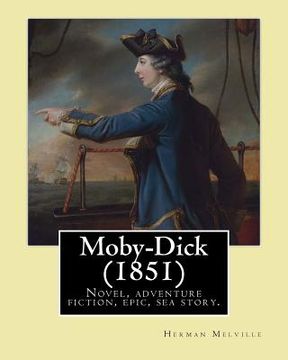Moby-Dick (1851). By: Herman Melville: Novel, adventure fiction, epic, sea story, encyclopedic novel. (en Inglés)
Reseña del libro "Moby-Dick (1851). By: Herman Melville: Novel, adventure fiction, epic, sea story, encyclopedic novel. (en Inglés)"
Moby-Dick; or, The Whale is a novel by American writer Herman Melville, published in 1851 during the period of the American Renaissance. Sailor Ishmael tells the story of the obsessive quest of Ahab, captain of the whaler the Pequod, for revenge on Moby Dick, the white whale that on the previous whaling voyage bit off Ahab's leg at the knee. The novel was a commercial failure and out of print at the time of the author's death in 1891, but during the 20th century, its reputation as a Great American Novel was established. William Faulkner confessed he wished he had written it himself, and D. H. Lawrence called it "one of the strangest and most wonderful books in the world", and "the greatest book of the sea ever written". "Call me Ishmael" is among world literature's most famous opening sentences. The product of a year and a half of writing, the book draws on Melville's experience at sea, on his reading in whaling literature, and on literary inspirations such as Shakespeare and the Bible. The white whale is modeled on the notoriously hard to catch actual albino whale Mocha Dick, and the ending is based on the sinking of the whaler Essex by a whale. The detailed and realistic descriptions of whale hunting and of extracting whale oil, as well as life aboard ship among a culturally diverse crew, are mixed with exploration of class and social status, good and evil, and the existence of God. In addition to narrative prose, Melville uses styles and literary devices ranging from songs, poetry, and catalogs to Shakespearean stage directions, soliloquies, and asides. Dedicated to Nathaniel Hawthorne, "in token of my admiration for his genius", the work was first published as The Whale in London in October 1851, and under its definitive title in New York in November. Hundreds of differences, mostly slight and some important, are seen between the two editions. The London publisher censored or changed sensitive passages and Melville made revisions, as well, including the last-minute change in the title for the New York edition. The whale, however, appears in both editions as "Moby Dick", with no hyphen. Because the British edition lacked the Epilogue, which accounts for Ishmael's survival, it seemed that the story was told by someone who was supposed to have perished. Many reviewers in British magazines recognized a violation of the rules of fiction and criticized the author for a serious flaw. Other reviewers, however, found the book too fascinating to dismiss it for these reasons. Some of the scornful British reviews were either reprinted or quoted in American periodicals, wrongfooting the American readers though the Epilogue was present in Moby-Dick. About 3,200 copies were sold during the author's life.... Herman Melville[a] (August 1, 1819 - September 28, 1891) was an American novelist, short story writer, and poet of the American Renaissance period. His best known works include Typee (1846), a romantic account of his experiences in Polynesian life, and his whaling novel Moby-Dick (1851). His work was almost forgotten during his last thirty years. His writing draws on his experience at sea as a common sailor, exploration of literature and philosophy, and engagement in the contradictions of American society in a period of rapid change. He developed a complex, baroque style: the vocabulary is rich and original, a strong sense of rhythm infuses the elaborate sentences, the imagery is often mystical or ironic, and the abundance of allusion extends to Scripture, myth, philosophy, literature, and the visual arts. Born in New York City as the third child of a merchant in French dry goods, Melville's formal education ended abruptly after his father died in 1832, leaving the family in financial straits. Melville briefly became a schoolteacher before he took to sea in 1839 as a common sailor on a merchant ship. In 1840 he signed aboard the whaler Acushnet for his first whaling voyage, but jumped ship in the Marquesas Islands.
Herman Melville (Nueva York, 1 de agosto de 1819-Nueva York, 28 de septiembre de 1891)1 fue un escritor, novelista, poeta y ensayista estadounidense, del período del Renacimiento estadounidense. Entre sus novelas más conocidas están Taipi (1846), basada en sus experiencias en la Polinesia, y la novela Moby Dick (1851),1 considerada su obra maestra y un clásico de la literatura universal.
Entre 1853 y 1855, publicó en la revista Putnam Magazine una serie de relatos, reunidos la mayor parte de ellos en The Piazza Tales, entre los que se encuentran dos de las narraciones más importantes de Melville: el cuento Bartleby, el escribiente y la novela corta Benito Cereno. También aparece el relato Las encantadas, compuesto de diez bocetos sobre las islas Galápagos unidos por un solo narrador. En 1857, El estafador y sus disfraces, también conocido como El embaucador (The Confidence-Man), fue el último trabajo de ficción en prosa que publicó. Buscando estabilidad económica, abandonó el oficio de escritor, aceptando un puesto como inspector de aduanas.
En sus últimos años, en los que tuvo que padecer además de la muerte de dos de sus hermanos también la muerte de dos de sus hijos, Clarence, por tuberculosis y Malcolm por un posible suicidio, además de la muerte de otro de sus hijos a los treinta y cinco años, Stanwix Melville, se dedicó a escribir poesía. Battle-Pieces and Aspects of the War, de 1866, es una reflexión poética sobre la Guerra de Secesión y Clarel: A Poem and Pilgrimage in the Holy Land, un poema épico de ficción, publicado en 1876. La novela Billy Budd, que dejó inconclusa y fue publicada póstumamente en Londres en 1924, es considerada una de las obras de mayor relevancia de la literatura estadounidense.
Ver más
Ver menos

